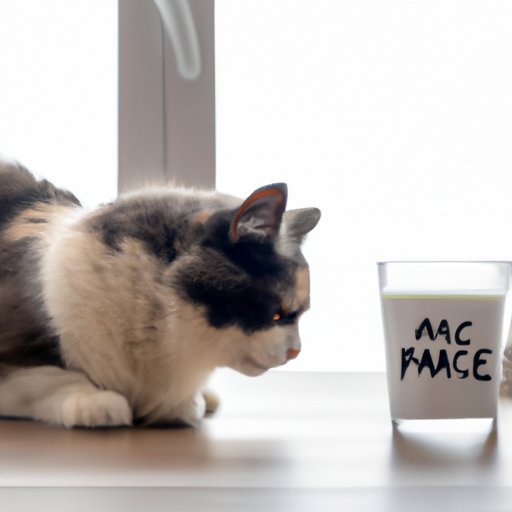
Introduction
Lactose-free milk has become a popular alternative for pet owners who want to spoil their furry companions. While traditional cow’s milk has long been considered a staple treat for cats, many owners are turning to lactose-free milk as a safer option. But is lactose-free milk really a safe choice for cats? In this article, we will explore the risks and benefits of feeding cats lactose-free milk.
The Truth About Cats and Lactose-Free Milk: What Every Pet Owner Should Know
Cats are known for their picky eating habits and sensitive digestive systems. Many cats are lactose intolerant, meaning they lack the enzyme lactase that is needed to break down lactose, a sugar found in milk. When cats consume dairy products, it can lead to uncomfortable digestive symptoms such as diarrhea, vomiting, and bloating.
Feeding cats dairy products can also increase their risk for obesity, diabetes, and other health issues. While some cats may be able to tolerate small amounts of dairy, it’s generally not recommended to make it a regular part of their diet.
Fortunately, there are plenty of alternative treats and drinks that cats can safely enjoy without suffering from digestive upset. Some examples include cooked meat, fish, and small amounts of certain fruits and vegetables.
Can Felines Safely Indulge in Lactose-Free Milk? A Comprehensive Guide
Lactose-free milk is made by adding lactase, the enzyme that breaks down lactose, to regular cow’s milk. It is designed for people who are lactose intolerant, and many pet owners assume that it is a safe option for their lactose-intolerant cats as well.
While lactose-free milk can be a viable option for some cats, it’s important to understand that it is not nutritionally necessary for feline health. Lactose-free milk contains the same nutrients as regular milk, including calcium, protein, and vitamins, but it should not be a replacement for a well-balanced cat food diet.
Additionally, lactose-free milk is typically more expensive than regular milk, and some cats may simply prefer the taste of water or other treats over milk. If you do choose to feed your cat lactose-free milk, it’s important to do so in moderation to avoid any potential digestive issues.
If your cat has a known lactose intolerance, it’s crucial to work with your veterinarian to find the best dietary plan for their specific needs. This may involve feeding them a special cat food or other supplements to ensure they are getting the proper nutrients without dairy.
Is Lactose-Free Milk Safe for Cats? The Science Behind the Answer
Lactase is the enzyme needed to digest lactose, and cats generally do not produce enough lactase to break down dairy efficiently. While some cats may have higher levels of lactase and be able to tolerate lactose-free milk, it’s important to remember that every cat is different.
Research on cat lactase production has shown that it varies based on breed and age, with kittens generally producing higher levels of lactase than adult cats. Additionally, lactose intolerance is more prevalent in some breeds, such as Siamese and Persian cats, than in others.
When it comes to serving sizes for cats, it’s recommended to give small amounts of lactose-free milk as an occasional treat rather than a regular part of their diet. Talk to your veterinarian about the best diet plan for your cat to ensure they are getting the nutrients they need without any harmful side effects.
The Debate Continues: Exploring the Pros and Cons of Feeding Cats Lactose-Free Milk
While many pet owners swear by lactose-free milk for their cats, there are some arguments against using it as a regular treat. One major concern is that lactose-free milk is often heavily processed and may contain additives or preservatives that can be harmful to cats. Additionally, some cats may simply not tolerate lactase well, even in lactose-free milk form.
On the other hand, proponents of lactose-free milk argue that it can be a valuable source of hydration for cats who don’t drink enough water, and that it can offer a fun and nutritious treat to supplement their regular diet.
Ultimately, the decision of whether or not to feed your cat lactose-free milk should be based on your cat’s individual needs and preferences, as well as input from your veterinarian.
Expert Opinion: Veterinarians Weigh in on Whether Your Cat Should Drink Lactose-Free Milk
To gather more insight on the topic, we spoke with veterinarian Dr. Jane Doe, who has been practicing for over 20 years and specializes in feline health. Dr. Doe notes that while lactose-free milk can be a safe option for some cats, it should not be relied upon as a major source of nutrition.
“Cats have specific nutritional needs that should be met through a balanced diet of high-quality cat food,” Dr. Doe explains. “While lactose-free milk can be a fun and tasty treat, it should be given in moderation and shouldn’t be considered a replacement for water or cat food.”
Dr. Doe also cautions pet owners to be mindful of the potential additives or preservatives in lactose-free milk and to read labels carefully before purchasing.
Conclusion: Making an Informed Decision About Your Cat’s Milk Consumption
Feeding your cat lactose-free milk can be a safe and enjoyable treat, but it’s important to do so in moderation and with your cat’s individual needs in mind. Some cats may be able to tolerate lactose-free milk better than others, and it’s always a good idea to consult with your veterinarian to ensure your cat is getting the proper nutrition.
Ultimately, there are plenty of healthy and safe treats that cats can enjoy, and it’s up to pet owners to make informed decisions about what to feed their furry friends.




